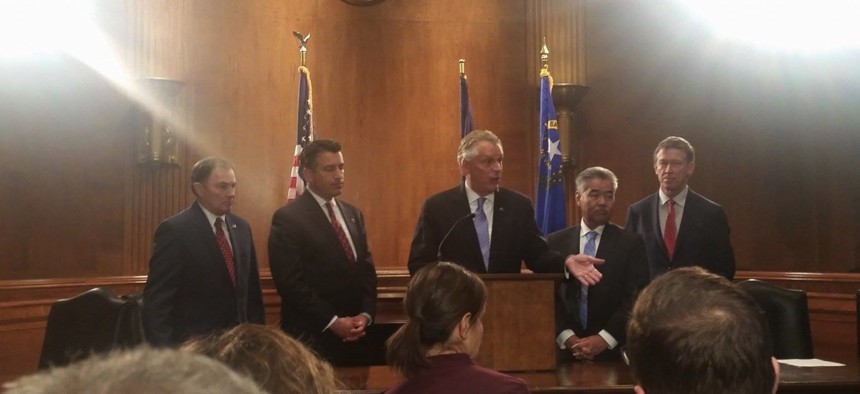Governors Assert Their Role in Federal Health Care, Infrastructure Conversations

From left, Utah Gov. Gary Herbert; Nevada Gov. Brian Sandoval; Virginia Gov. Terry McAuliffe; Hawaii Gov. David Ige; and Colorado Gov. John Hickenlooper brief the press after meeting with President Trump on Monday in Washington D.C. Dave Nyczepir / Route Fifty
"I think the rhetoric of the campaign has hit the reality of governing,” said Virginia Gov. Terry McAuliffe, also chair of the National Governors Association.
WASHINGTON — Up until the National Governors Association’s press briefing Monday on Capitol Hill, state and local government associations have expressed mostly optimism toward working with President Trump’s administration the next four years.
That optimism was still there when Virginia Gov. Terry McAuliffe briefed reporters, in the Dirksen Senate Office Building, on the NGA’s morning meeting with Trump. But it was tempered with concern, primarily for the “chilling effect” the administration’s position on immigrants and refugees is having on state economies.
Trump’s attempt to ban travel to and from seven Muslim-majority countries has already cost Virginia two economic development projects, McAuliffe said. The NGA chair told the president he needs to guarantee fearful immigrants only the undocumented guilty of crimes will be deported—if that is indeed the administration’s position—as Homeland Security Secretary John Kelly assured him in a separate meeting.
“Now I’m going to watch very closely, and if anyone who is watching this here knows of people where that has been a problem, I would like to know,” McAuliffe said. “And I have no hesitation of picking up the phone calling the president, the vice president or Secretary Kelly. We need to treat people with dignity and respect in this country.”
After meeting with Trump, the White House barred Democratic governors like McAuliffe and some Republican governors from participating in the traditional bipartisan press conference outside the West Wing, reported The Hill. Former presidents Obama and George W. Bush allowed governors from the opposition party to speak in years past.
Health care comprised the bulk of the governors’ discussion with Trump, McAuliffe said, with the NGA unified in not wanting a single citizen to lose health care.
“That’s an issue of over 300,000 lives in the state of Nevada,” said the state’s Republican Gov. Brian Sandoval, one of the few to expand Medicaid under the Affordable Care Act and who was excluded from the White House presser.
From there, governors’ opinions on overhauling health care diverged with McAuliffe opposing Medicaid block grants that GOPers on the Hill seem to favor because they would shift the federal government’s financial burden onto states.
Utah Gov. Gary Herbert, a Republican, expressed interest in block grants and, even more so, per capita caps—pointing out his state did not expand Medicaid under the ACA. The median age in Utah is less than 30 years old.
“We have a different need for health care,” Herbert said, imploring the Hill to respect state differences in process while asserting governors have a role to play in crafting flexible legislation at the national level—as opposed to a one-size-fits-all approach.
McAuliffe did credit Health and Human Services Secretary Tom Price for dropping in on the governors’ meeting with Trump, having only been in the role 12 days.
Infrastructure was another hot topic at the Trump meeting, and McAuliffe said he thinks the federal government will move toward fostering more public-private partnerships at the state level, which make the most of taxpayer money. While that’s no substitute for a dedicated source of funding, the governor said, it will suffice in the meantime.
“We can work with that,” he said. “Give us the tools at the state level.”
Dave Nyczepir is a News Editor at Government Executive’s Route Fifty and is based in Washington, D.C.
NEXT STORY: Can Florida's First Needle Exchange Help Curb HIV?






